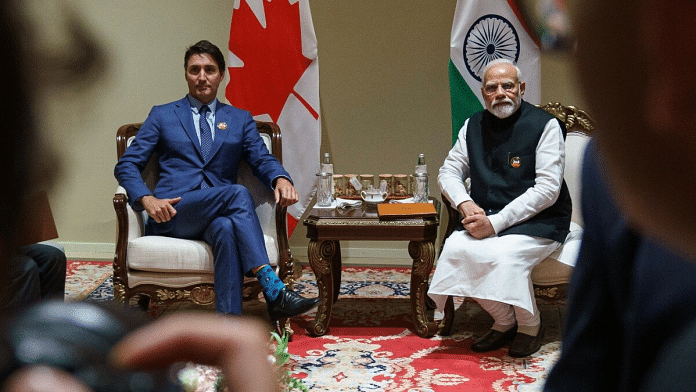New Delhi: Canadian Prime Minister Justin Trudeau’s aim of not losing the Sikh vote to the New Democratic Party (NDP) curtailed his government’s options to find a workable policy solution with India, writes his former foreign policy advisor Omer Aziz.
Aziz worked as a foreign policy adviser for the Government of Canada focusing on India between July 2017 and January 2018, according to his social media profile.
Aziz highlighted in his article on how the Indo-Canadian relationship was headed in the “wrong direction” during his first briefing at the Ministry of Foreign Affairs.
“There had been rumours of Indian intelligence services operating in the Canadian suburbs for years (along with others),” he writes in an opinion piece – ‘The real reasons Canada’s relationship with India is broken’ — in The Globe and Mail.
Aziz added, “The Indians counter-alleged that Canada was giving shelter, if not encouragement, to Khalistani extremists — supporters of an independent Sikh homeland, partitioned out of India.”
This resulted in the two sides talking “past each other” for years, Aziz opined.
Furthermore, he describes that the Sikhs in Canada likened India’s violence against the community to genocide. Add to this, the legacy of the Air India Flight 182 bombing in 1985, which led to the death of 329 individuals, primarily of Indian origin — the deadliest aviation terrorist attack before 9/11 — added another layer of complexity to the relationship.
The two factors Aziz highlights that had “recently and radically” changed in global affairs were the elections of Prime Minister Narendra Modi in India in 2014 and President Donald J. Trump in the US in 2016.
“Mr. Modi’s ideology sees India as a primarily Hindu nation, and it stokes ethnic chauvinism and grievance against anyone who dares criticise it,” he writes, adding that Modi as a “strongman” would not take a lecture from Canada.
“The second factor was the election of Donald Trump, which moved everyone’s attention and focus to Washington dramas. India, meanwhile, had gone fully nationalist by this point.”
Aziz also argues that under Modi, India’s democracy has faced challenges, and that there can be “no doubt” that as a Prime Minister he has used state violence against minorities in “frightening and authoritarian ways.”
Also Read: Opposition’s Poilievre more popular in Canada as Trudeau’s domestic woes persist, shows opinion poll
Trudeau’s domestic concerns
In 2017, Canadian born Sikh Jagmeet Singh became the leader of Canada’s third largest party by number of seats in the Federal Parliament – the New Democratic Party (NDP). This gave Trudeau a pause in attempting to find ways to solve the issues regarding Khalistan between India and Canada.
“There are some 770,000 Sikhs in Canada, one of the most politically organised communities in the country. Canadian Sikhs have kept the issue of Sikh justice on the agenda by continually advocating and pressuring politicians,” Aziz writes.
“…the Sikh issue has an enlarged influence on our bilateral relations with India. It came up in every meeting, in every talking point, in every pull-aside. Unfortunately, Canadian politicians then didn’t care enough about either Sikhs or India to give this the policy attention it deserved.”
‘Canada’s Eurocentrism has caused a loss’
India viewed Canada as a “bit player” in global affairs, Aziz explains, and adds that this view was mirrored by the establishment in Ottawa, which did not “respect” New Delhi to its peril.
This is a result of Canada’s Eurocentrism world view as a result of its political establishment being “old and white,” he opines.
“Western Europe and the United States were our focus, and some ministers could hardly see beyond London or Berlin. There’s a reason why, along with India, relations with China, with Latin American countries, with much of Africa have deteriorated,” Aziz writes.
The Eurocentrism and the ethnic domestic battles has hampered Canada’s long-term foreign policy goals, leading to the near rupturing of its ties with India and a split in the Western alliance.
With major global realignments taking place, including the rise in influence of the Quadrilateral Security Dialogue — consisting of India, the US, Australia and Japan — a grouping Canada was not invited to, Aziz argues that it is worrying that Ottawa is no longer a part of the table where those decisions are made.
“Canada may never be a major power in international affairs. But it can still be a serious one,” Aziz writes.
(Edited by Tony Rai)
Also Read: A paper tiger? Why 1987 extradition treaty with Canada has brought back just 6 fugitives to India



